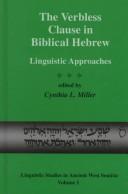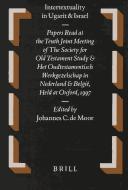| Listing 1 - 5 of 5 |
Sort by
|

ISBN: 1575060361 1575065177 Year: 2014 Publisher: Winona Lake : Eisenbrauns,
Abstract | Keywords | Export | Availability | Bookmark
 Loading...
Loading...Choose an application
- Reference Manager
- EndNote
- RefWorks (Direct export to RefWorks)
Thirty years after seminal studies by Francis I. Andersen and Jacob Hoftijzer, members of the 1996 SBL section on Linguistics and Biblical Hebrew gathered to reconsider the topic of the verbless clause in Hebrew. The results are published here, demonstrating the gains made in the interim and providing direction for future research.Contents: Cynthia L. Miller, “Pivotal Issues in Analyzing the Verbless Clause”; Walter Gross, “Is There Really a Compound Nominal Clause in Biblical Hebrew”; Cameron Sinclair, “Are Nominal Clauses a Distinct Clausal Type?”; Randall Buth, “Word Order in the Verbless Clause: A Generative-Functional Approach”; Vincent DeCaen, “A Unified Analysis of Verbal and Verbless Clauses within Government-Binding Theory”; J. W. Dyk and E. Talstra, “Paradigmatic and Syntagmatic Features in Identifying Subject and Predicate in Nominal Clauses”; Takamitsu Muraoka, “The Tripartite Nominal Clause Revisited”; Alviero Niccacci, “Types and Functions of the Nominal Sentence”; Kirk E. Lowery, “Relative Definiteness and the Verbless Clause”; Lenart J. de Regt, “Macrosyntactic Functions of Nominal Clauses Referring to Participants”; E. J. Revell, “Thematic Continuity and the Conditioning of Word Order in Verbless Clauses”; Ellen van Wolde, “The Verbless Clause and Its Textual Function
Hebrew language --- Hébreu (Langue) --- Clauses --- Propositions --- Bible. --- Language, style. --- 221.02*1 --- Oud Testament: bijbelse filologie: hebreeuws --- 221.02*1 Oud Testament: bijbelse filologie: hebreeuws --- Hébreu (Langue) --- Jewish language --- Jews --- Semitic languages, Northwest --- Clauses. --- Languages --- Bible. -- O.T. -- Language, style.
Book
ISBN: 0773412301 9780773412309 Year: 2000 Publisher: Lewiston : The Edwin Mellen Press,
Abstract | Keywords | Export | Availability | Bookmark
 Loading...
Loading...Choose an application
- Reference Manager
- EndNote
- RefWorks (Direct export to RefWorks)
This study provides three important contributions to the study of biblical Hebrew poetry: first, it surveys scholars of non-biblical, metrical poetry to ascertain how meter is defined in the field of literary criticism; second, it categorizes and critiques all significant proposals regarding meter in biblical Hebrew poetry from the time of Philo to the present; finally, it tests the most viable of the proposals against a large sample of poetic texts from the Hebrew Bible. The author generates statistical profiles for the texs and compares them with similar profiles from two categories of contr
Bible. O.T. -- Language, style. --- Hebrew language -- Metrics and rhythmics. --- Hebrew poetry, Biblical -- History and criticism. --- Hebrew poetry, Biblical --- Hebrew language --- Religion --- Philosophy & Religion --- Judaism --- History and criticism --- Metrics and rhythmics --- Bible. --- Language, style. --- Antico Testamento --- Hebrew Bible --- Hebrew Scriptures --- Kitve-ḳodesh --- Miḳra --- Old Testament --- Palaia Diathēkē --- Pentateuch, Prophets, and Hagiographa --- Sean-Tiomna --- Stary Testament --- Tanakh --- Tawrāt --- Torah, Neviʼim, Ketuvim --- Torah, Neviʼim u-Khetuvim --- Velho Testamento

ISSN: 01697226 ISBN: 9004103422 9004497927 9789004103429 9789004497924 Year: 1995 Volume: 34 Publisher: Leiden Brill
Abstract | Keywords | Export | Availability | Bookmark
 Loading...
Loading...Choose an application
- Reference Manager
- EndNote
- RefWorks (Direct export to RefWorks)
In Old Testament exegesis a gap is widening between the adherents of the "diachronic", historical-critical approach and those who out of dissatisfaction with both the results and the methods of this "classical" approach opt for a wide variety of "synchronic" approaches. The Ninth Joint Meeting of the Dutch "Oudtestamentisch Werkgezelschap" and the British "Society for Old Testament Study", held at Kampen 28-31 August 1994, brought together partisans from both camps who engaged in a most interesting and fruitful debate on one of the major methodological issues confronting modern O.T. scholarship. This volume contains the papers read as well as some reports from the workshops. With indices of texts and subjects.
Bible. --- Criticism, interpretation, etc. --- Language, style --- Bible --- Criticism, interpretation, etc --- Congresses --- 221.06 --- Oud Testament: hermeneutiek; exegese --- 221.06 Oud Testament: hermeneutiek; exegese --- Antico Testamento --- Hebrew Bible --- Hebrew Scriptures --- Kitve-ḳodesh --- Miḳra --- Old Testament --- Palaia Diathēkē --- Pentateuch, Prophets, and Hagiographa --- Sean-Tiomna --- Stary Testament --- Tanakh --- Tawrāt --- Torah, Neviʼim, Ketuvim --- Torah, Neviʼim u-Khetuvim --- Velho Testamento --- Bible. Old Testament --- Bible. - O.T. - Criticism, interpretation, etc. - Congresses. --- Bible. - O.T. - Language, style - Congresses. --- Bible AT --- Herméneutique --- Exegesis. --- Literary Criticism (Biblical Science) --- Old Testament.

ISBN: 0253332362 0585104743 9780585104744 9780253332363 Year: 1997 Volume: *2 Publisher: Bloomington Indiana University Press
Abstract | Keywords | Export | Availability | Bookmark
 Loading...
Loading...Choose an application
- Reference Manager
- EndNote
- RefWorks (Direct export to RefWorks)
221.015 --- Hebrew poetry, Biblical --- -Narration in the Bible --- 221.015 Oud Testament: literaire kritiek; authenticiteit; bronnenstudie; Formgeschiche; Traditionsgeschichte; Redaktionsgeschichte --- Oud Testament: literaire kritiek; authenticiteit; bronnenstudie; Formgeschiche; Traditionsgeschichte; Redaktionsgeschichte --- History and criticism --- Narration in the Bible. --- History and criticism. --- Bible. --- Language, style. --- Criticism, interpretation, etc. --- Bible stories --- Biblical stories --- Bijbel--Verhalen --- Bijbelse verhalen --- Bijbelverhalen --- Narration dans la Bible --- Narration in the Bible --- Récits bibliques --- Judaism --- Religion --- Philosophy & Religion --- Antico Testamento --- Hebrew Bible --- Hebrew Scriptures --- Kitve-ḳodesh --- Miḳra --- Old Testament --- Palaia Diathēkē --- Pentateuch, Prophets, and Hagiographa --- Sean-Tiomna --- Stary Testament --- Tanakh --- Tawrāt --- Torah, Neviʼim, Ketuvim --- Torah, Neviʼim u-Khetuvim --- Velho Testamento --- Bible. Old Testament --- Language, style --- Hebrew poetry [Biblical ] --- Bible. - O.T. - Language, style. --- Hebrew poetry, Biblical - History and criticism.
Book
ISBN: 9781575062563 1575062569 1575066815 9781575066813 Year: 2012 Volume: 7 Publisher: Winona Lake Eisenbrauns
Abstract | Keywords | Export | Availability | Bookmark
 Loading...
Loading...Choose an application
- Reference Manager
- EndNote
- RefWorks (Direct export to RefWorks)
In this book John Cook interacts with the range of approaches to the perennial questions on the Biblical Hebrew verb in a fair-minded approach. Some of his answers may appear deceptively traditional, such as his perfective-imperfective identification of the qatal-yiqtol opposition. However, his approach is distinguished from the traditional approaches by its modern linguistic foundation. One distinguishing sign is his employment of the phrase "aspect prominent" to describe the Biblical Hebrew verbal system. As with almost any of the world's verbal systems, this aspect-prominent system can express a wide range of aspectual, tensed, and modal meanings. In chap. 3, he argues that each of the forms can be semantically identified with a general meaning and that the expressions of specific aspectual, tensed, and modal meanings by each form are explicable with reference to its general meaning. After a decade of research and creative thinking, the author has come to frame his discussion not with the central question of "Tense or Aspect?" but with the question "What is the range of meaning for a given form, and what sort of contextual factors (syntagm, discourse, etc.) help us to understand this range in relation to a general meaning for the form?" In chap. 4 Cook addresses long-standing issues involving interaction between the semantics of verbal forms and their discourse pragmatic functions. He also proposes a theory of discourse modes for Biblical Hebrew. These discourse modes account for various temporal relationships that are found among successive clauses in Biblical Hebrew. Cook's work addresses old questions with a fresh approach that is sure to provoke dialogue and new research.
Hebrew language --- Hébreu (Langue) --- Tense. --- Verb. --- Temps --- Verbe --- Bible. --- Language, style. --- Bible --- Language, style --- 221.02*1 --- Jewish language --- Jews --- Semitic languages, Northwest --- Oud Testament: bijbelse filologie: hebreeuws --- Languages --- Antico Testamento --- Hebrew Bible --- Hebrew Scriptures --- Kitve-ḳodesh --- Miḳra --- Old Testament --- Palaia Diathēkē --- Pentateuch, Prophets, and Hagiographa --- Sean-Tiomna --- Stary Testament --- Tanakh --- Tawrāt --- Torah, Neviʼim, Ketuvim --- Torah, Neviʼim u-Khetuvim --- Velho Testamento --- 221.02*1 Oud Testament: bijbelse filologie: hebreeuws --- Hébreu (Langue) --- Tense --- Verb --- Aspekt --- Hebräisch --- Modalität --- Europäische Kommission --- Europaweites Mobilitätsprogramm für den Hochschulbereich --- Trans-European Mobility Scheme for University Studies --- Trans-European Mobility Programme for University Studies --- Tempus --- Tempus Programm --- Tempus Projekt --- Tempus Programme --- Tempus Project --- Hochschulbildung --- Förderungsprogramm --- Supranationale Organisation --- 07.05.1990-08.11.1993 --- Bible / O.T. / Language, style. --- Althebräisch --- Biblisches Hebräisch --- Bibelhebräisch --- Alttestamentliches Hebräisch --- Klassisches Hebräisch --- Biblisch-hebräisch --- Kanaanäische Sprachen --- Jüdische Sprachen --- Hebraistik --- Verbalaspekt --- Aktionsart --- Verbum --- Zeitwort --- Verbalsystem --- Tunwort --- Verben --- Hebrew language - Tense. --- Hebrew language - Verb.
| Listing 1 - 5 of 5 |
Sort by
|

 Search
Search Feedback
Feedback About UniCat
About UniCat  Help
Help News
News